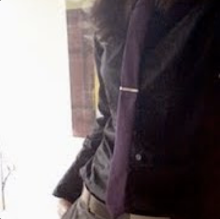
I have been thinking a lot about the impact one's surroundings has on their mind and writing. By 'surroundings', here, I mean a few things. One, 'surroundings' currently and historically. Two, surroundings as physical: meaning both in structure or lack there of (bedroom? street? someone's porch until they kick you off? ), as well as physical meaning experience of (physical/emotional) of the surroundings (are you safe and warm? are you writing in a graveyard? are you writing when you will ultimately have to hide what you've written in a cavity in order to smuggle it out? are you writing after days of isolation and, if so, was this by your choice or someone else's?)
I think of the descriptions of Heidegger's weird cabin in the Black Forest where he would write to the point that people would, reluctantly, send people out to see if he was still alive. I think of the graphic novelist who wrote From Hell (Alan Moore) who meticulously documented and researched the Jack the Ripper crimes and who also lives more or less as a total recluse writing and researching. I think of people who disappear- consentually and against their will-- and what it does to their minds and writing.
I think of Jean Genet (prison), of Oscar Wilde (prison), of Alicia Partnoy (disappeared/torture survivor of Argentina's dirty war; author of The Little School). I think of passages from Judith Herman's book, again, (Trauma and Recovery), and I think of the writings of the people in my life and in the world who are in prison (state-sanctioned or otherwise), and those who have been released.
(pause. sidenotes that are not-so sidenotes:)
-I remember reading a number of years ago when researching Oscar Wilde's trials and life that he wrote De Profundis (the letter he wrote while in prison to his lover that he basically went to prison for) while only being allowed one (or three, I can't recall) piece of paper a day. When he had filled it, the paper was taken away from him and kept. The next day, he'd the same amount of paper and continue. Far into the process, the prison personnel let him know that they had destroyed the writing. When he learned this, he started over.*
-Heidegger's Hut:

-Alicia Partnoy was disappeared and tortured for seven years, the majority of which she was made to wear a blindfold:
My nose allows me to see. No, I haven't suddenly become metaphoric. Indeed, it's thanks to my nose that I can see. What happens is that its shape keeps my blindfold slightly lifted. Portions of the world parade before these small slits. Only Peine knows how to tie a blindfold well enough so it can trick my nose. Other guards just stuff in pieces of cotton and tape to block these little, illegal and dangerous windows. Meanwhile, my nose seems to grow, proudly, with every new blindfold. The reason is that finally, my nose and I have reconciled.---From "My Nose", The Little School
(pause. end of sidenotes that are not-so sidenotes.)
In any case, it's something I have been thinking about a lot:
Where did the people write that have moved you? What was happening around them? (To them?)
If you write, what are the answers to these questions for yourself?
Be well; Be loved,
K.
*=It is said that this explains a lot of the repetition of the letter: he never knew where he left off or what he had already said.
P.S. Somehow in this I think of Sarah Winchester and her house, but I'm not sure why. I could venture some analytical wonder of what she would have written in that house while she lived there, but really I think it's just because I think it's weird-spooky and kind of awesome:
creep city
Please note the brief appearance of the amazingly limpwristed psychic

you make me want to live in a library just to sleep in a bed of biographies. this is terribly delicious and i find myself wanting you to tell me more stories.
ReplyDelete